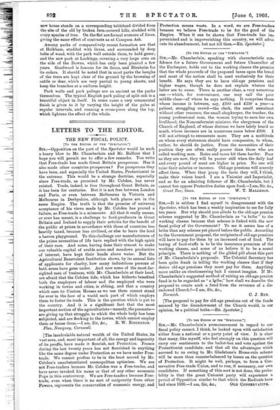LETTERS TO THE EDITOR.
THE NEW FISCAL POLICY.
[To THE EDITOR OP THE "SPECTATOR-1 Sm,—Opposition on the part of the Spectator would be such a heavy blow to Mr. Chamberlain and Mr. Balfour that I hope you will permit me to offer a few remarks. You write that Free-trade has made Great Britain prosperous. Has it also made other countries prosperous P For prosperous they have been, and especially the United States, Protectionist in the extreme. This would be a strange doctrine, especially since Free-trade, as promised by Mr. Cobden, has never existed. Trade, indeed, is free throughout Great Britain, as it has been for centuries. But it is not free between London and Paris, or even between Melbourne in Victoria and Melbourne in Derbyshire, although both places are in the same Empire. The truth is that the promise of universal acceptance of his views made by Mr. Cobden has proved a failure, so Free-trade is a misnomer. All that it really means, or ever has meant, is a challenge to food-producers in Great Britain and Ireland to supply their articles for the benefit of the public at prices in accordance with those of countries less heavily taxed, because less civilised, or else to leave the land a barren playground. To this challenge our manufacturers of the prime necessities of life have replied with the high spirit of their race. And some, having done their utmost to make our valuable capital of arable acres and meadows productive of interest, have kept their heads above water. But the Agricultural Benevolent Institution shows, by its annual lists of applicants for charity, how many industrious persons of both sexes have gone under. And now some of the most far- sighted men of business, with Mr. Chamberlain at their head, are afraid that the Cobden tide, which has hitherto benefited both the employers of labour and the employed who were working in towns and cities, is ebbing, and that a country which uses its Custom Houses as we use them cannot stand for ever in the face of a world each part of which employs them to foster its trade. This is the question which is put to the country. And it is a significant fact that the most important section of the agriculturists—namely, the peasants— are giving up that struggle, to which the whole body has been subjected, and are flocking to the towns, which cannot employ [The incalculable natural wealth of the United States, its vast area, and, most important of all, the energy and ingenuity of its peoille, have made it flourish, not Protection. France during the last twenty years has not flourished in anything like the same degree under Protection as we have under Free- trade. We cannot profess to be in the least moved by Mr. Cobden's unsubstantiated cosmopolitan optimism. We are not Free-traders because Mr. Cobden was a Free-trader, and have never invoked his name or that of any other economic Pope in this controversy. We are Free-traders because Free- trade, even when there is no sort of reciprocity from other Yowers, represents the conservation of economic energy, and Protection means -waste. In a word, we are-Free-traders because we believe Free-trade to be for the good of the Empire. When it can be shown that Free-trade has im poverished and is impoverishing this country, we will advo-- cate its abandonment, but not till then.—ED. Speotator.]










































 Previous page
Previous page